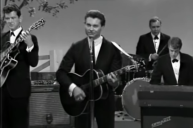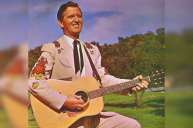Country music's list of living legends over 80-years-old includes Willie Nelson, Kris Kristofferson, Bobby Bare, Loretta Lynn and, less obviously, Stonewall Jackson, a star from before the surviving Highwaymen's time in the spotlight.
Videos by Wide Open Country
It's easy to assume that Stonewall Jackson is a stage name, chosen to honor the Confederate general with controversial monuments in Tennessee, Thomas "Stonewall" Jackson. Yet the future country star was legally named Stonewall Jackson upon his Nov. 6, 1932 birth in Tabor City, North Carolina. He maintained his regionally relevant name during his South Georgia upbringing.
Jackson's first big break in Nashville came in the mid-'50s when his demo tape landed on the desk of Acuff-Rose president Wesley Rose. Soon after, he became the first artist without a recording contract to join the Grand Ole Opry. In addition, he toured with his honky-tonk mentor Ernest Tubb before landing a deal with Columbia Records in 1958.
Over a Decade of Hits
https://www.youtube.com/watch?v=wnHmBvMJPXo
Read More: 10 Legendary Guests of The Marty Stuart Show
Jackson immediately shook up the country charts, beginning with the George Jones-written top 10 hit "Life to Go" in 1958. The next year, the more pop-friendly "Waterloo" became his signature song. It warned of the fates sealed by the actions of three men: Napoleon, Adam from the Old Testament and folk song inspiration Tom Dooley. It was one of the great crossover hits of its time, cracking the Top 5 of the all-genre Billboard Hot 100.
From there, Jackson found his greatest fame as one of the lonesome voices of the post-Hank Williams honky-tonk era, putting him in the same class as Webb Pierce, Faron Young, Lefty Frizzell, Ray Price and others.
His 35 Top 40 country hits between 1958 and 1971 range from the "teenage tragedy" car wreck tale "B.J. the D.J." (1964) to a countrified take on the Lobo hit "Me and You and a Dog Named Boo" (1971). Beyond those novelty songs, Jackson kept the old-time sound relevant with additional greatest hits cuts "Smoke Along the Track" (1958), "Why I'm Walkin'" (1960), "A Wound Time Can't Erase" (1962), "Leona" (1962), "Old Showboat" (1963), "Don't Be angry" (1964), "I Washed My Hands in Muddy Water" (1965), "Stamp Out Loneliness" (1967) and the final Top 50 entry of his recording career, "Herman Schwartz" (1973).
Old-Time Thought in a New Musical Landscape
He also addressed a timely issue in 1966 with "The Minute Men (Are Turning in Their Graves)." While Glen Campbell's "Galveston" and other hits in the coming years spoke up for the young men making the ultimate sacrifice in Vietnam, Jackson's sentiment was completely pro-government.
In 2008, Jackson won an out of court settlement from an age discrimination lawsuit against the Grand Ole Opry. According to CMT, Jackson's suit stated that Opry general manager Pete Fisher's decision to cut Jackson's appearances in favor of younger artists cost the legend his health insurance.
Jackson was inducted into the Country Music Hall of Fame in 2012.
In all, he's a representative of the days of smooth-voiced, sharp-dressed country singers who helped position what was once dismissed as "hillbilly" music as a commodity that would move uptown.
This story originally ran on Aug. 8, 2018.
Now Watch: Things You Didn't Know About Randy Travis
https://rumble.com/embed/u7gve.v3va8j/




